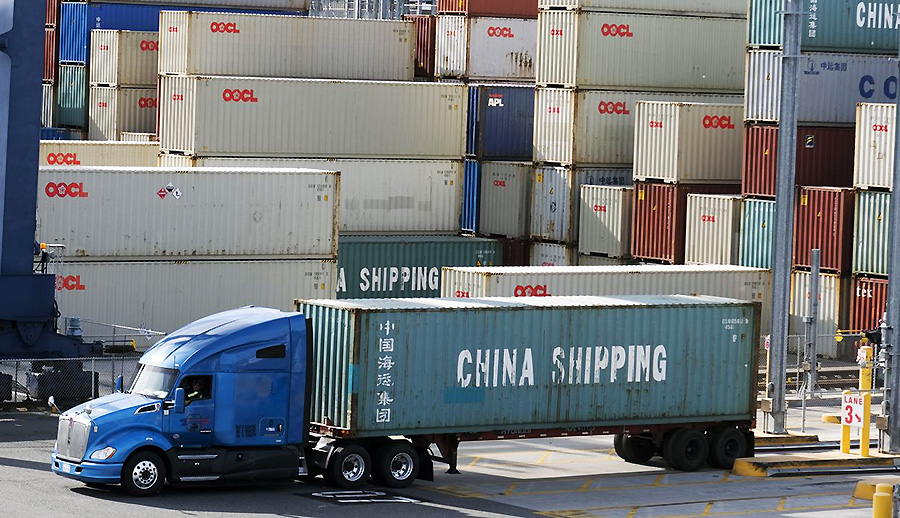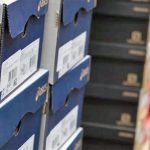By Eric Smith
<span style="color: #a3a3a3;">The news out of Oregon last weekend that Nike Inc. and Columbia Sportswear Co. disinfected their respective headquarters due to coronavirus concerns generated plenty of buzz across the industry.
Though neither company reported an infection among its ranks, their proximity to several known cases of coronavirus in the Pacific Northwest prompted the deep cleaning. Nike even shut down its World Headquarters in Beaverton, OR, all weekend.
But as disruptive as that might sound, what’s happening farther down the West Coast is a broader, more tangible sign of the coronavirus’ true economic impact.
The ports of Los Angeles and Long Beach, which account for a third of all U.S. imports (more than 9 million TEUs), are projecting a 25 percent decline in inbound cargo shipments for February and a 15 percent decline for the first quarter.
Quieter ports are expected after China’s Purchasing Managers’ Index (PMI) plummeted to a record low of 35.7 in February from 50 in January, according to the National Bureau of Statistics. Anything below 50 shows economic contraction.
Despite companies warning of drastic hits to their top and bottom lines or canceling executive trips to China, calm docks and idle longshoremen perhaps best depict how coronavirus, or COVID-19, is snarling global supply chains. Its impact is now being felt across shipping lines, at ports, on highways and in stores.
“Clearly the near-term impact is one of reduced activity not only on international lanes linked to China but also in terms of reduced freight activity in the U.S. given the expected fall-off in imported container goods over the next month or longer,” UBS analyst Thomas Wadewitz wrote in a note to clients.
Supply Won’t Meet Demand
The port slowdown is yet another example of how coronavirus is disrupting business up and down the supply chain. It’s affecting active lifestyle companies of all sizes, from mom-and-pop gear makers with only a few links to multibillion-dollar, multinational corporations with complex networks of sourcing, production and distribution.
Brands whose supply chain—sourcing or manufacturing—touches China at all are being impacted, but those that produce primarily in China have been hit especially hard. Companies that export into China are also feeling the brunt as stores there have been shuttered for more than a month.
For example, Adidas said that its business in the greater China area had dropped by about 85 percent year-on-year in the period since Chinese New Year on January 25. China accounted for 20 percent of Adidas’ sales in 2018.
Acushnet Holdings Corp., the parent of Titleist, FootJoy, Kjus and other brands, said that while supply chain disruption is minimal for the company thanks to production and sourcing outside of China, it is expecting significant pressure on retail sales in the second quarter. The company estimates a $40 million impact on revenue and an $18 million effect on adjusted EBITDA in Q2.
Crocs Inc. said many partner stores in China are closed temporarily. Those that remain open are operating on a reduced schedule and experiencing lower-than-usual traffic levels, said President and CEO Andrew Rees. The company also expects Q1 revenues to be negatively impacted by approximately $20 million to $30 million, including from coronavirus-related disruptions to its Asia business.
Columbia Sportswear Chairman, President and CEO Tim Boyle last Thursday outlined how the outbreak is affecting his company’s supply chain. The outdoor apparel and footwear giant is seeing disruption for only a low-double-digit percentage of its finished goods, but because contract manufacturers source a “large portion of raw materials from China,” he said, it’s become a massive pain point.
“Temporary factory closures and the pace of workers returning to work have impacted our contract manufacturers’ ability to source certain raw materials and to produce and fulfill finished goods in a timely manner,” Boyle said. “The outbreak is also impacting distribution and logistics providers’ ability to operate in the normal course of business. These supply chain impacts will likely affect our ability to timely fulfill orders and meet consumer demand. Given we have already received substantially all of our Spring 2020 product, potential order fulfillment delays would impact future seasons.”
As SGB Executive outlined in a report on the coronavirus two weeks ago, companies such as Nike, VF Corp., Canada Goose Holdings Inc., Puma, Under Armour, Vista Outdoor Inc., Moncler, Skechers, Yeti Holdings Inc., Anta Sports, Callaway Golf Co. and others will take a hit to their earnings in the first two calendar quarters of the year.
The result of all these companies—plus many, many more outside this space—reducing guidance in light of the coronavirus emergency? Not only did the stock market post its worst week since the Great Recession in 2008, but businesses won’t be able to meet consumer demand for numerous products in the coming months.
Reliance On China Still Strong
It’s not, of course, just the publicly traded companies ravaged by global supply chain issues. RovR Products, a Colorado-based cooler manufacturer, will feel the sting of some delayed shipments, said the company’s founder, Tom DeFrancia.
“We do a lot of manufacturing in February, so that put us behind,” he told SGB Executive. “We have a lot of shipments that go out after Chinese New Year, so in February and March, we do a lot of manufacturing and a lot of shipping. That’s been affected. We’ll probably see higher demand than we have supply through April and May.”
Jon Frederick, country manager for Rab and Lowe Alpine (both are owned by UK-based Equip Outdoor Technologies Ltd.), said the brands are proceeding with their plans for development, production and sales launch for Fall/Winter 2020, Spring/Summer 2021 and Fall/Winter 2021, but they remain cautious.
“Our general statement is that ‘We are proceeding with business as usual—for now,’” he told SGB Executive in an email. “It is inevitable that coronavirus will impact [upcoming] seasons; the question right now is where will the impacts hit hardest. Despite having a diverse supply chain, the industry still relies on China for the majority of trim materials which can definitely gum up the works. We anticipate a backlog at the ports once things are up and running full steam and this will most likely impact [Fall/Winter 2020] deliveries to retailers. We have plans in place to reduce or mitigate this issue so our retailers are affected as little as possible.”
As Frederick and others have pointed out, this is a “rapidly changing story”—much like the trade war over the last two years—and could change at a moment’s notice. But executives still can’t travel to China to check on production and samples for the coming seasons are likely to be delayed.
And there is much hand-wringing over the right course of action for companies as they rework their supply chains and communicate with channel partners over delivery dates and quality control. The Outdoor Industry Association, which is helping member organizations respond to the crisis, offered this comment to SGB Executive on Tuesday.
“We are deeply concerned about the health and welfare of all who are threatened with exposure to COVID-19 and hope that the situation returns to normal as soon as possible. We are also hearing from some of our members that, like many industries, exports of outdoor products from China and inputs sourced from China have been impacted. Still, there are a lot of unknowns regarding how long the disruption may last and what impact resuming production will have on the industry. OIA will continue to monitor the issue and work with members to determine next steps.”
DeFrancia did have some good news on Monday. The company’s manufacturing partner is “back up and running,” albeit at a slower clip than before because of reduced crews and new restrictions on employees.
Another positive development: Some companies have been shifting production out of China to cope with the ongoing trade war. Had they stayed there and not moved to Vietnam or elsewhere in Asia to avoid tariffs, the situation could be worse. Between the tariffs and now coronavirus, look for more businesses to reconsider their partner countries for production and sourcing.
Events Large And Small At Risk
With coronavirus infections surpassing 10,000 outside of China, the disruption is affecting consumers too, even as some in the medical community consider the reaction to the outbreak overblown.
According to a survey from Coresight Research, nearly three-quarters of U.S. consumers would stay away from malls or shopping centers if the coronavirus outbreak worsens in the U.S. More than half (58 percent) of consumers surveyed this week said they will likely avoid public spaces overall or travel if it spreads further here.
Events also are at risk of being postponed or even canceled. The 2020 Tokyo Olympics is more likely to be canceled than moved or rescheduled if, by late May, the coronavirus situation is deemed too dangerous to go ahead with the original schedule, International Olympic Committee member Dick Pound told the Associated Press.
On a smaller scale, Footwear Distributors and Retailers of America (FDRA) announced Monday it was scrapping some events “until further notice,” Matt Priest, the trade association’s president and CEO posted on LinkedIn.
“We are doing so for the health and safety of footwear executives and professionals, as well as to be respectful of the new heavy strains this global challenge has put on the operations of our members,” he wrote. “We want footwear companies to be 100 percent focused on their business during this challenging period. While these events are important, they are not business-critical. We will release new dates for these events in the coming weeks.”
Though it’s not related to the outdoor or active lifestyle industries, the American Physical Society canceled its conference this week at the Colorado Convention Center in Denver, CO—home to Outdoor Retailer’s two annual events, including Summer Market in late June.
OR couldn’t comment specifically on Summer Market but on Tuesday evening said it was “actively planning” to host the event.
“The Outdoor Retailer team is monitoring the situation daily and following the guidelines set-forth by our federal and local government and health agencies and are in close, ongoing contact with local Denver authorities,” OR officials said in a statement. “In addition, we are working with other show teams within Emerald who are staging shows ahead of Outdoor Retailer to ensure the highest level of control measures and best practices are being implemented around the show and onsite. Our focus is to keep attendees, exhibitors and the greater outdoor community updated regularly.”
The Running Industry Association (RIA), meanwhile, said its annual Kick Show, set for Denver in May, will go on as scheduled.
“For the RIA, it is business as usual until we learn more about the spread of the virus and where containment is headed,” RIA Executive Director Terry Schalow told SGB Executive in an email. “Yes, we are aware of companies outside of our channel canceling conferences, but at this point, it would be premature to arrive at a hard decision. A few weeks from now will probably provide more insight, and we’ll respond accordingly.”
Darren Bush, co-founder of the Big Gear Show, the new outdoor hardgoods trade show set to make its debut this July in Salt Lake City, said this to SGB Executive when asked about the potential for canceling the show: “As a former epidemiologist and employee of the CDC, this is an easy answer: No,” he wrote in an email. “If it becomes obvious that it is a significant problem in terms of incidence, we might consider it.”
Despite the ongoing supply chain chaos, this week brought some good news too. The stock market rebounded on Monday. And factories are starting to reopen in China, albeit slowly and not yet to capacity. But with consumers in the U.S. still wary as new coronavirus cases are revealed and companies’ supply chains under pressure for months to come, it could be a while before business returns to normal.
“The economic side of this is huge, and it’s affecting everywhere, not just China,” DeFrancia said. “We live in a global economy and we all affect each other.”
SGB Executive will continue to monitor the impact of coronavirus on the industry.
Editor’s note: After this story went to press, more instances of disruption due to the coronavirus came to light, including REI closing its Seattle-area corporate campuses and the North American Handmade Bicycle Show postponing its March event.
Photo courtesy Ringo Chiu/Zuma Press
















